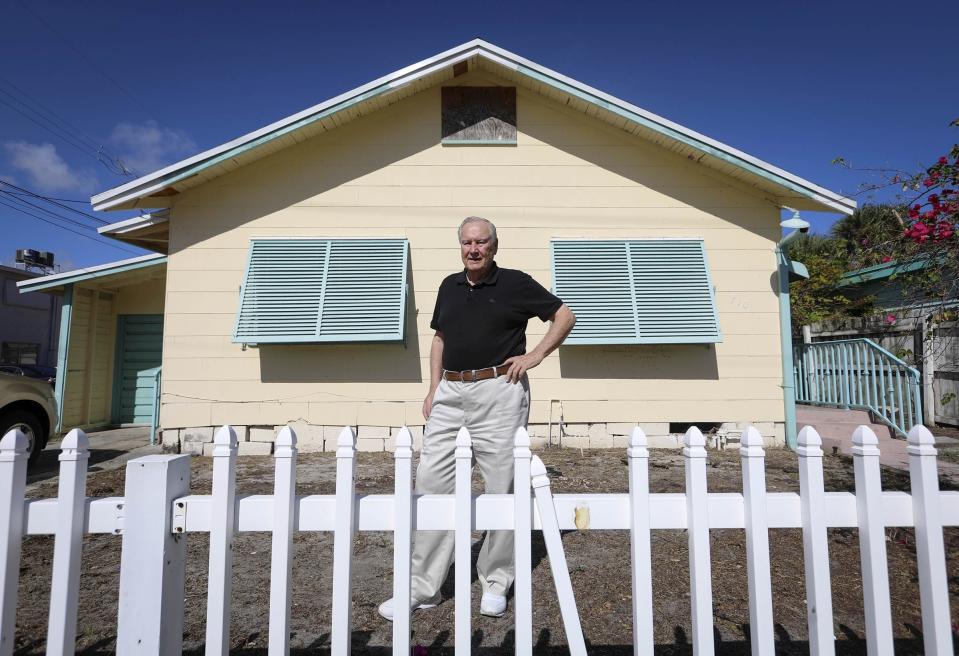Lake Worth Beach-born genealogy site sells for millions to a German company
LAKE WORTH BEACH — Detectives' favorite genealogy database for solving cold cases — one born in Palm Beach County and based for years in the spare bedroom of a Lake Worth Beach home — has just been sold to a German company. Genealogists and privacy advocates alike are eyeing the future of GEDmatch and its 1.8 million DNA profiles as it changes hands.
The Netherlands-based biotech firm Qiagen bought GEDmatch and its parent company for $150 million on Jan. 9. Curtis Rogers, the 84-year-old ancestry buff who founded GEDmatch, said the database was valued at around $60 million in the deal — four times what he sold it for in 2019.
The news comes on the heel of numerous high-profile arrests made with the help of genetic genealogy, including that of Bryan Kohberger, accused of killing four University of Idaho students in November.
"I'm really, really proud of what's been happening to my baby," Rogers said. "I'd like to make sure that it continues to happen properly."

Million-dollar DNA site GEDmatch began as South Florida genealogist's passion project
Rogers and John Olson launched GEDmatch in 2010 as a free site for genealogy hobbyists. People who had their DNA tested by private companies like 23andMe could upload the results to GEDmatch and search for other relatives who uploaded theirs.
While larger DNA testing companies like 23andMe and AncestryDNA forbid law enforcement from accessing their databases without a search warrant, GEDmatch had no such restriction. This made the site a boon for the detectives in California who used it to track down Joseph DeAngelo, the so-called Golden State Killer.
His arrest shone a spotlight on the use of investigative genetic genealogy, as well as on GEDmatch and its band of volunteers. Rogers said he became inundated with offers to buy the site and its trove of genetic data — but he held out until he found a company he trusted to take the reins. The genetic blueprint of its users was at stake.
Brett Williams, the CEO of a forensic genomics company in California called Verogen, convinced Rogers that he and his team were up to the task. Verogen bought GEDmatch at the end of 2019 for $15 million, triggering a wave of speculation over how the database might change in the hands of a for-profit company.
Rogers and Olson were known and trusted among the genetic genealogy community, said Amy Lynn McGuire, a Palm Beach Gardens native and biomedical ethics professor at the Baylor College of Medicine. Its new owners at Verogen were not.
"There was a lot of concern," she said. "Like, 'Wait a minute: What if Verogen changes the rules of game and I don't want to play anymore?'"
Verogen stayed true to its word, Rogers said. It kept GEDmatch free and secure for genealogists and ensured that only those who wanted to be visible to law enforcement were. Though Rogers has no financial stake in GEDmatch, its owners at Verogen welcomed his input and kept him close.
Does new owner mean changes for GEDmatch users? Seller doesn't expect any
Rogers said he has no relationship with the executives at Qiagen, but he's hopeful they'll continue to operate GEDmatch responsibly. Others will take more time to convince.
"Anybody who has their DNA in the GEDmatch database will probably want to be checking the terms and conditions soon," said Angela Tanzillo-Swarts, a professor of forensic molecular biology at the University of North Texas.
A spokesperson for Verogen said GEDmatch users shouldn’t notice a change to the database under Qiagen’s ownership, and that the two companies' visions are "very much aligned." The same people running GEDmatch at Verogen will continue to run it under Qiagen.
Though it's headquartered in Europe, where genetic privacy laws are more stringent than in the U.S., Qiagen will continue to operate GEDmatch out of Verogen's San Diego office, said Thierry Bernard, the company's CEO.
Qiagen launched the first commercial kits used to purify DNA in the late 1990s. It partnered with Verogen in 2021 to distribute the company's human identification tools, like GEDmatch.
"The objective for us is to give Verogen more means and more firepower to develop their solutions," Bernard said. "Not to change everything."
Hannah Phillips is a journalist covering public safety and criminal justice at The Palm Beach Post. You can reach her at hphillips@pbpost.com.
This article originally appeared on Palm Beach Post: DNA database GEDmatch bought for $150M by German biotech firm Qiagen

